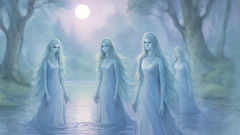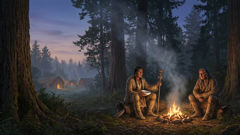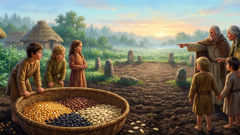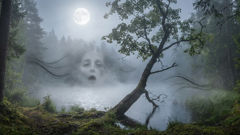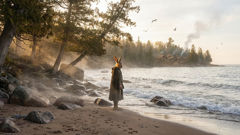Introduction
In the heart of ancient Lithuania, where silver mists drifted like breath over mossy earth and the song of birds twined with the hush of wind in dark pines, people spoke in reverent whispers of the Laumes. These were not mere tales to hush restless children or pass the time by the fire; the Laumes were as real to the villagers as the moon above or the roots beneath their feet. As night thickened, fishermen would hurry from the lakes, and woodcutters gathered their tools before dusk, all wary of the hour when the veil between worlds thinned. For it was then that the Laumes—mysterious, beautiful spirits draped in silver and clad in the dew-laced silks of the forest—would step forth from hidden glens or rise from the surface of quiet lakes, their hair long as rivers, their eyes ancient as stones. They were said to spin the threads of human destiny, weaving fates as fine as gossamer and as strong as the oldest oak. Sometimes, they appeared to the lost or desperate, offering kindness; other times, their presence meant a test, a riddle, or a reckoning. The Laumes were neither wholly merciful nor cruel. They could be gentle as rainfall or fierce as a winter storm, and every encounter with them left a mark that would echo through generations. Their story is one of enchantment and warning, of nature’s wild justice, and of hearts measured not by wealth or strength but by their honesty and courage. To know the Laumes is to glimpse the soul of Lithuania itself, where myth and moss entwine, and destiny is spun beneath the watchful stars.
I. The Whispers in the Wildwood
Long ago, when the world was young and the boundaries between realms as thin as spider silk, the forests of Žemaitija sprawled like a green sea across the land. People lived in humble villages hemmed by towering pines and birches, always mindful that the wild belonged not only to deer and wolf, but to spirits older than memory. Among these, none were as feared or revered as the Laumes.
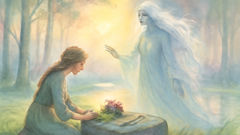
The elders spoke of how the Laumes could shape-shift: one moment a willow swaying at the water’s edge, the next a woman with eyes like polished amber. They wove their magic by moonlight, spinning fate from clouds and binding promises with reeds. For some, they were guardians—healing the sick, guiding lost children home. For others, they were avengers, punishing greed, pride, or cruelty with riddles, illusions, or storms. The balance they kept was ancient, and no one, not even the village priest, dared question their ways.
In the village of Dainava, nestled between the broad rivers and deep forests, there lived a girl named Egle. She was known for her wild black hair and eyes the color of forest shadows. Egle’s family tilled a small patch of land on the edge of the woods. Though poor, their home was filled with laughter and song. Egle loved to wander alone, picking wildflowers or listening to the calls of cranes as they circled overhead.
One dusk, as fog crept low and cool over the earth, Egle lingered longer than usual. A sadness weighed on her heart—her youngest brother had fallen gravely ill, and no herbal poultice nor whispered prayer seemed to break his fever. Egle knelt at the edge of a marshy glade, eyes closed, desperate enough to make a plea to the unseen powers of the wild.
Her voice trembled as she spoke: “If any hear me in this place—spirit, goddess, Laume—I beg for mercy. Spare my brother, and I will offer what you ask.”
The air stilled. The night seemed to inhale. From the reeds, a figure emerged—a woman tall and slender, wrapped in veils of mist. Her skin shone like river pearls, and her hair tumbled to her ankles in silvery waves. Egle gasped and lowered her gaze, for she knew at once she stood before a Laume.
The spirit’s voice was soft as the shifting rushes: “Why do you call me, mortal child?”
With trembling words, Egle pleaded for her brother’s life. The Laume listened, her eyes both kind and sorrowful. “Every wish carries its weight,” she replied. “Would you bargain for love with fate?”
Egle nodded, tears slipping down her cheeks.
The Laume knelt and cupped Egle’s chin. “You have spoken from your heart. I will test you, as is our way. Bring me a gift at dawn—one that shows you know the soul of this forest.”
Then, in a shimmer of dew, she vanished, leaving Egle alone with her hope and fear.
All night, Egle wandered. She gathered moss from ancient oaks, plucked dew-kissed violets, and picked a feather from a sleeping owl. She watched the stars, listened to the river, and whispered thanks to every living thing. At dawn, she laid her offerings where she’d met the Laume. As the first sunlight kissed the treetops, the spirit appeared once more.
“Your gift is not gold or gem,” the Laume murmured. “It is respect for all that lives. This is what binds our worlds.”
She touched Egle’s brow, and in that instant, the girl felt a surge of warmth and strength. When Egle returned home, her brother’s fever had broken. Word spread, and while some doubted, many believed Egle had been chosen by the spirits.
But Egle knew the Laumes’ blessing came with a deeper lesson: to cherish the land, to honor every life, and to remember that fate is woven from kindness as much as from courage.
II. The Test of Hearts and Shadows
Seasons passed, and Egle grew into a young woman, her fame spreading quietly beyond her village. Some came seeking her counsel, believing she held the Laumes’ favor; others eyed her with suspicion, for mortals touched by spirits often walked a path both blessed and fraught.
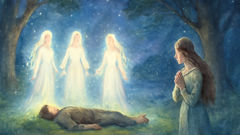
One stormy night, when thunder cracked over the forest and wind whipped the branches into wild shapes, there came a pounding at Egle’s door. Standing on her threshold was a stranger—a young man, soaked and shivering, clutching a sack to his chest. His name was Matas. He claimed to be fleeing bandits who had ransacked his home far to the north. Egle’s family took him in, sharing what little they had. Matas spoke little, but his eyes watched everything: the play of firelight, the way Egle’s mother smoothed her children’s hair, the pattern of rain on the window.
That night, as the household slept, Egle awoke to a whisper at her window. The Laume appeared, half-shadow, half-light. “You showed mercy once,” she intoned, “but mercy is not always simple. The forest listens. The forest tests.”
Egle followed the Laume into the woods, heart thundering. In a glade lit only by flickering stars, three Laumes stood in a circle around Matas, who lay asleep on the moss. Their voices braided into song:
“Gold in the hand, secrets in the heart,
Which weighs truer when worlds fall apart?
A lie in the dark or a truth in the day,
What will you choose if you must pay?”
Egle was told: Matas bore a secret as heavy as stone. She could speak it aloud—betray him for his hidden crime—or keep his secret and risk her own fate.
Egle knelt beside Matas. Her voice shook as she spoke: “He is a guest in our home. Let him stand before you and choose his truth.”
At that, Matas woke, startled by the spectral figures. He confessed: he had fled not bandits, but justice. In desperation, he had stolen to feed his starving siblings, then run when accused. He wept, fearing retribution.
The eldest Laume’s eyes softened. “There is courage in confession,” she pronounced. “But every deed shapes the weave.” She turned to Egle. “Your kindness gave him a chance to face his soul. Not all would do the same.”
With a gesture, the Laumes released Matas from their spell. In the morning, he was gone, leaving behind a carving of an oak leaf—an emblem of gratitude and new beginnings.
Through this test, Egle learned that mercy and truth are not always easily reconciled. The Laumes’ magic was not just in their power over fate but in their ability to reveal the tangled choices within every heart. From that day, Egle grew wise in her counsel, weighing not only right and wrong but the winding paths that led between.
III. The Weaving of Destiny
Years flowed by like the rivers that cut through Lithuania’s wild heart. Egle’s family prospered quietly, their fields lush and their home a haven for wanderers. Yet always, there lingered the memory of the Laumes and their silent promises—a reminder that fate’s thread is delicate, easily tangled or torn.
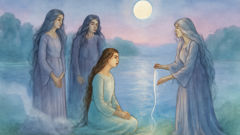
One autumn evening, as scarlet leaves whirled on chill winds and the air smelled of woodsmoke and damp earth, Egle sat alone by the lake. Her hands idly twisted lengths of flax into thread—an old task, taught by her grandmother. Across the water, the mist thickened and shapes flickered within.
The Laumes returned, shimmering as though woven from moonbeams and fog. They gathered around Egle, and one drew forth a spindle of silver.
“We spin the destinies of mortals,” she said, her voice echoing the rhythm of water. “But mortals too must choose how to shape their fate.”
They offered Egle a choice: to remain among her people, carrying the wisdom she’d gained, or to join the Laumes—leaving behind mortal ties, becoming a spirit of lake and forest herself. The offer was both an honor and a test.
Egle thought of her family—their laughter, their struggles, their warmth. She thought of the villagers who sought her advice, the way the land bloomed under her care. She thought too of the sorrow in the Laumes’ ancient eyes, their endless vigil over humankind.
At last, Egle spoke: “My place is here, where love and sorrow are woven together. Let me walk between worlds—a guardian of both.”
The Laumes smiled, and from their spindle they spun a length of shimmering thread, draping it around Egle’s shoulders. “So be it,” they intoned. “May your days bind earth to sky, sorrow to joy, and memory to hope.”
From then on, Egle became known as the Wise Woman of Dainava. People came from distant villages to seek her counsel—not because she wielded magic, but because she listened deeply, saw beyond anger or pain, and helped others find their own courage.
And sometimes, when moonlight touched the lake and mists danced across the water, villagers would glimpse Egle at its edge, her hair trailing like willow branches, her figure limned in silver. They wondered if she was woman or spirit, or something between—one who carried the blessing and burden of the Laumes within her heart.
Thus, the tale of the Laumes lived on: a reminder that destiny is spun not only by spirits in the shadows but by every act of kindness, every choice made in love or sorrow. In the hush of ancient forests and the glimmer of quiet lakes, their legacy endures—woven into the soul of Lithuania itself.
Conclusion
The Laumes linger in the imagination of Lithuania, forever entwined with its forests and lakes. Their tale—woven through generations—reminds us that the heart of every myth beats with both warning and hope. In Egle’s journey, we see how nature’s wildness reflects our own: mysterious, unpredictable, yet full of quiet grace. The Laumes do not merely punish or reward; they invite us to look inward, to weigh our actions, to respect the land and those who share it. When mists gather on forgotten paths or moonlight shimmers on still water, remember the Laumes: enchantresses who shape destiny, who test not for cruelty but for understanding. Their lessons endure wherever courage, compassion, and respect for the earth are cherished—and in every heart that chooses kindness, even when shadows lengthen and choices blur.

